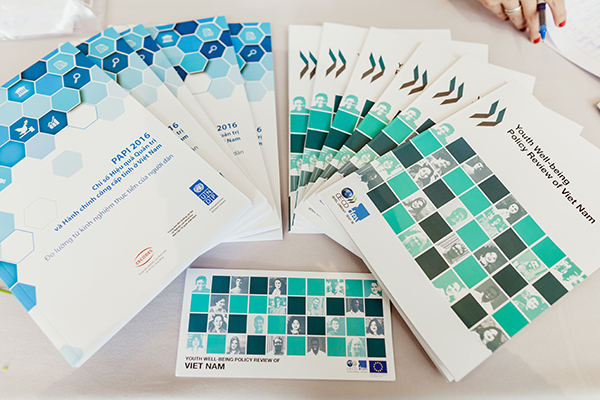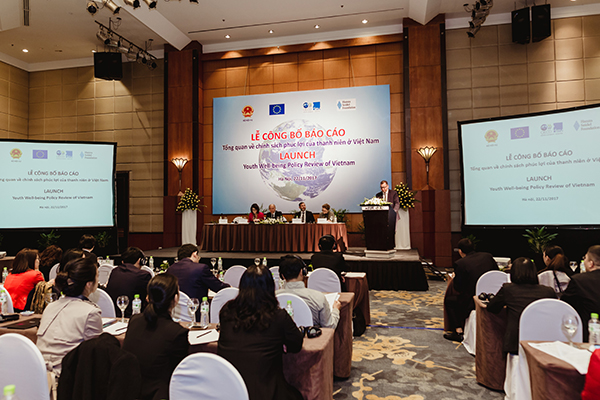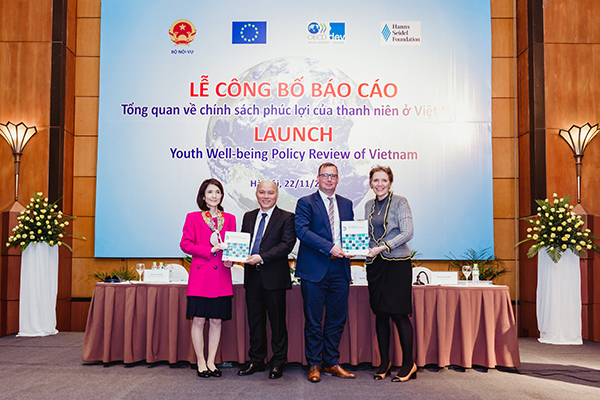Launching of OECD's “Youth Well-being Review for Viet Nam”
“Invest more in Viet Nam’s disadvantaged and rural youth”, says new OECD report supported by HSF

The OECD “Youth Well-being Policy Review of Viet Nam”
HSF
Economic and political reforms (Doi Moi), initiated in the mid-1980s, have transformed Viet Nam into one of the world’s fastest-growing economies. However, growth does not automatically translate into income gains for the poor, nor job creation for youth. The country has yet to improve the well-being of a sizeable share of youth, especially those disadvantaged and in rural areas, according to the OECD Development Centre’s Youth Well-being Policy Review in Viet Nam.
The OECD Development Centre’s analysis of youth in Viet Nam uses an innovative multi-dimensional approach to assess their situation in health, education, employment and civic participation. “With one quarter of its population aged between 15 and 29, Viet Nam has tremendous potential for further development. Vietnamese youth are healthier and better educated than their parents and stand to benefit from positive economic prospects”, explained Mrs. Naoko Ueda, Vice-Director of the OECD Development Center at the launch. “The share of tertiary educated among youth aged 25-29 is increasing, and 70% of them have high-skilled jobs. But these young people represent a small share of the youth population (8% among the 25-29 have a tertiary degree). The majority of young Vietnamese are disadvantaged (low-skilled and early school leavers) and live in rural areas”, she continued.

Opening plenum for the launch
HSF
“As the report acknowledges, youth issues are gaining prominence in Viet Nam’s policy agenda, as demonstrated by the adoption of the Youth Law in 2005 and the Vietnamese Youth Development Strategy 2011-2020”, states Mr. Vu Dang Minh, Director General of the Department for Youth Policy at the Vietnamese Ministry for Home Affairs. “For those strategic targets to be reached, a better prioritisation of programmes, more co-ordinated inter-ministerial efforts, and increased investment in youth programmes are essential. Sustaining Viet Nam’s remarkable economic success requires that all of its youth contribute to and benefit from the fruits of growth.”
The report highlights the urgent need to invest more in human capital development. Improving the quality, accessibility and relevance of vocational education and training (VET) is key to narrowing the gap between the skills of young people and those that employers need - especially in rural and remote areas. According to the review, this requires to further train teachers, modernise equipment and facilities, and better evaluate the impact of VET programmes. Better linkages between VET institutions and local enterprises would also help understand labour market needs and improve the relevance of these programmes.

Presenting the “Youth Well-being Review for Viet Nam”: Mrs. Naoko Ueda, Vice-Director of OECD Development Center; Mr. Vu Dang Minh, Director General of the Department for Youth Policy at the Vietnamese Ministry for Home Affairs; Dr. Axel Neubert, Regional Representative at the Hanns Seidel Foundation; Mrs. Astrid Bant, UNFPA Representative in Viet Nam
HSF
“I am convinced that this report will contribute to improve the situation of VN’s youth by providing scientific assistance to national policy makers and other stakeholders to design policies targeted to vulnerable youth groups”, said Dr. Axel Neubert, Regional Representative of the Hanns Seidel Foundation.
After a development period of three years the report was been launched on 22 November in Hanoi. Hanns Seidel Foundation began the cooperation with OECD in Vietnam in 2013. Since 2014 the office in Hanoi is supporting the research on the Youth Well-being Police Review.
